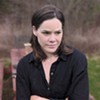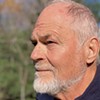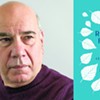Published July 26, 2006 at 3:34 p.m.
Poets and linguists don't often see eye to eye when it comes to language. While linguists have a weakness for equations, poets nurse a soft spot for mysticism. In his Nobel lecture, Seamus Heaney compared his first aural experiences to time travel. In "The Prelude," William Wordsworth took a walk in the woods and found a new god in the mountains around him. "There is a dark / inscrutable workmanship that reconciles / Discordant elements," he wrote, studying the trees around him.
But what if that inscrutable workmanship were not God -- or even a goddess-like Nature -- but a primal kind of language? The question is provocatively posed by Johnson-based poet Neil Shepard's third volume of verse, This Far From the Source. Here is a "moss-crawler, rock-clasper" of a poet, one for whom the fiddleheads and shadflies, the marsh marigold, blossom of plum and persimmon, and chokecherry of Vermont's landscape send him leaping for a Peterson's, not the prayer mat.
"Lean in for the sweet soto voce," he writes in "Oh! On an April Morning," inviting the reader to cup an ear at some flowers, "then gradually lean out for the rising tonal babel, snickers, snorts, giggles and guffaws, interrogatory, exclamatory, imperative, imperious oh! -- it kept me up all night." This might be the first man ever to need a white-noise machine to protect him from the cacophony of the Vermont woods.
Shepard only has himself to blame for his insomnia. Like Galway Kinnell before him, he clearly possesses a woodsman's acute sonar. He hears how "a woodpecker drilling a hollow bole / sends a dew-heavy sugar plum, a love-tap/echoing across the distance." The flowers speak. Even rivers turn into garrulous scribes before his eyes. "A thousand feet down, the Rio Grande daily / reinscribes itself on scrolls of sandstone," Shepard writes in "From the Bridge at Taos."
As in the fragments of Heraclitus, these poems create a kind of economy of the elements. Shepard registers the power of stone, the beauty of birds and birdsong, and the permanence of dust -- which hints at the very long engagement that awaits us all.
South of town, twisters kick up red dust
and bring it in -- it settles on everything:
on cash crop pecans and measly greasewood;
on sharecropper shacks in the shadow
of Wal-Mart; on migrant tents beside the faux-
Spanish villas; on crude oil pumps; on all of us.
Powdered like this, we look prematurely wise.
Shepard can accordion his lines into poetry whenever he wants, but just as happily keeps things to "free verse's egalitarian." Robert Lowell is his hero for being able to do both equally well. Shepard's other literary lions, from Jack Kerouac to Gerald Stern, wind up as characters in a few of these poems -- the former as a wine-drunk hobo, the latter a kind of poetic weight lifter: "a man with words bursting from his chest."
But the influence overshadowing all is Hayden Carruth, whose marbled particulars and grinding downward momentum echo through Shepard's poems like a literary homage, a fore-fatherly channeling. (There is even a poem about Carruth's writing shack). Like Carruth in his early days, Shepard elides rather than illuminates when it comes to the personal. His embrace of the natural world's ancient language occasionally renders him a stranger in his own life.
In "The Secret Lives of Birds," his father's deteriorating memories as he enters old age are detritus for the birds.
What is the meaning of memory
this far from the source? It's summer,
always summer in father's Maine coast films.
Unlike today's stark shots: father,
midwinter, coast of Florida, sound
asleep among the snowbirds, seagulls
circling overhead, seagulls
circling down, seagulls perching
near the chaise, scavenging
whatever we've left them.
It is refreshing to come across a poet who peers into the reflecting pool and sees the ripples rather than his own image. "My past was / never a high tower," he explains in "Weed Whacker." "I'm pre-Copernican," he yodels in another, referring to the astronomer who put the sun at the center of the universe. "The sun's / desertion is in my way / of seeing."
Like most poets, Shepard is better at feeling than at thinking. At times, one wishes he would expound less and embody more. When he latches on to an idea, rather than a thing, his phrasing goes goopy and almost new-age. I don't want to visit the "the place of pre-delight" with him, or gaze at "the high cliffs of death." I'd also rather not hear about how he's been "inhaling flowers like there's no / tomorrow."
At his best, Shepard sees through ideas into the truth behind them. This means that most of his best poems are almost naturalistic, like the exquisite, bog-ridden "The Source." But there are also some terrific poems about the language of memory. "I'm from Leominster, Couldn't be Prouder, Can't Hear Me Now, I'll Yell a Little Louder" recalls a long-ago high school cheer, how it was performed "In megaphones, in union, the fans / chanting with the cheerleaders, building, building / the round vowels -- prouder, louder -- and the /two-line rhyme itself until its pitch / raised the rafters."
This is about all we can expect language to do, Shepard seems to be saying: to raise high the roof beams so we can get an eyeball at the world around us. Like a carpenter, Shepard sidles forth in these poems with his pencil and ruler, diagramming "the underside" of sentences that nature has made, all the while aspiring -- and sometimes succeeding -- to make some as beautiful himself.
From This Far From the Source
"The Source"
Snow deep in north pasture, more
On the way. How odd to read
Her letters, where light lies
Easy on Polynesian waves. She's
There on the quay or under the shade
Of mango and palm, draped in a red
Pareu, listening to the liquid
Sounds of their vowels.
Here, a month of zero
Mercury and words chuffed
In little clouds drifting off
To who knows where.
My brain's split between hemispheres.
Was there ever a year she desired
This house and pasture?
Don't lie. Of course, of course--
And yet--just yesterday
I broke through snowcrust
On a downward-sloping field,
Broke through to a deep-running
Spring we'd discovered years ago
When we built here. That gusher
Down in the foundation--we were
Astonished at the water's force.
Half-feared it would obliterate
Concrete, and half-desired it--
Our house balanced on a spume,
A great spinning, shining ride
In the revolving years
Of early love. It almost washed
The backhoe clean as it struck
The source. Later, the force
Lessened to a stream
Manageable and constant.
We diverted it with a simple
Lead pipe out to the field
And forgot about it.
Until now, until I broke through.
Snow falling on my blue parka,
Blue gloves, blue hat. I know
Where this stream ends--
Where all the springs drain--
Down at the bottom of the pasture
Where birches bend under all this
White weight, and swamp begins.
And nothing but willows grow
In the boggy hummocks, iced up now,
Their roots lifted up
As if trying to take a first, slow step
Out of the rime and ooze. And every living
Thing falls down into the watery spaces
They've abandoned.
More By This Author
Speaking of...
-

Woodstock Poetry Festival Replaces Bookstock
May 2, 2024 -

Video: Visiting the Wind Phone at the Lanpher Memorial Library in Hyde Park
May 2, 2024 -

Vermont Book Award Winners Announced
May 6, 2023 -

Vermont State Colleges Reverse Library Layoffs, Athletics Shakeup
Apr 24, 2023 -

Local Children's Book Buyers Offer Reading Recommendations
Nov 15, 2022 - More »
Comments
Comments are closed.
From 2014-2020, Seven Days allowed readers to comment on all stories posted on our website. While we've appreciated the suggestions and insights, right now Seven Days is prioritizing our core mission — producing high-quality, responsible local journalism — over moderating online debates between readers.
To criticize, correct or praise our reporting, please send us a letter to the editor or send us a tip. We’ll check it out and report the results.
Online comments may return when we have better tech tools for managing them. Thanks for reading.









































